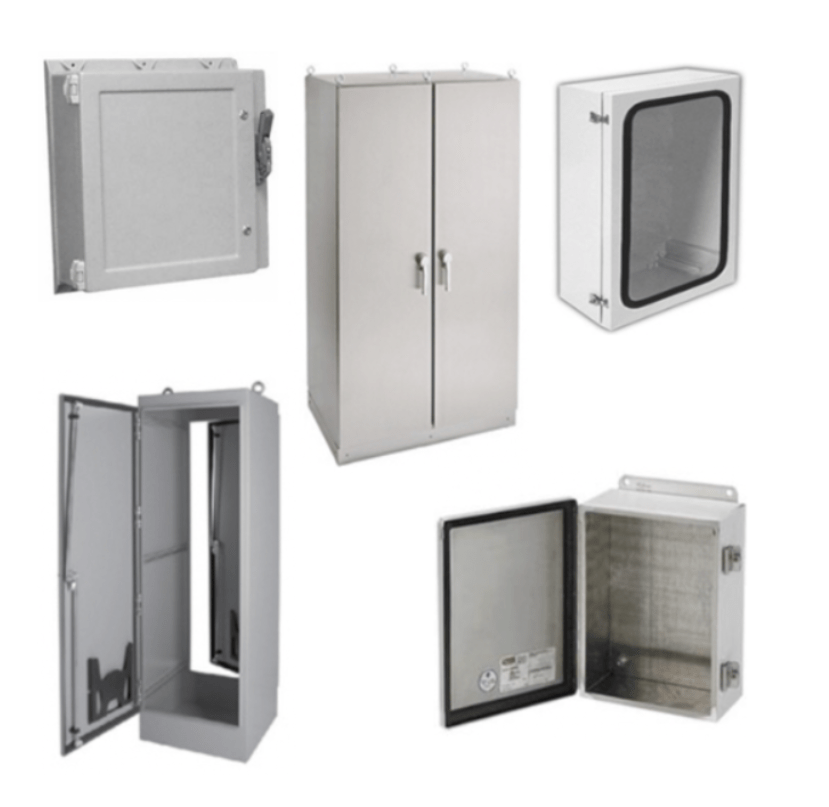Stainless steel enclosures are essential components in various industries and applications where protection and durability are paramount.
These enclosures are designed to house electronic components, control panels, and other sensitive equipment in harsh environments.
In this guide, we will explore the features of stainless steel enclosures, their uses, and why they are preferred over other materials.
Features of Stainless Steel Enclosures
Stainless steel enclosures offer robust protection against harsh environments, ensuring durability and corrosion resistance. They provide excellent temperature tolerance and are ideal for both indoor and outdoor applications. Additionally, these enclosures feature a sleek, professional appearance while maintaining structural integrity under various conditions.
They can be easily customized to meet specific requirements, such as size, shape, and mounting options. This flexibility makes them suitable for a wide range of applications in industries such as oil and gas, wastewater treatment, food processing, and more. Additionally, stainless steel enclosures offer a high level of security for the equipment they house.
They can be equipped with various locking mechanisms to prevent unauthorized access, ensuring the safety and integrity of the equipment inside. In conclusion, stainless steel enclosures are a reliable and durable solution for protecting equipment in demanding environments. Their resistance to corrosion, impact, and versatility make them an ideal choice for various industries where equipment needs to be safeguarded from harsh conditions.
Uses of Stainless Steel Enclosures
Stainless steel enclosures are used in a wide range of industries and applications where protection and reliability are critical. One common use is in the manufacturing sector, where stainless steel enclosures are used to house control panels, PLCs, and other electronic components.
These enclosures protect the sensitive equipment from dust, dirt, and moisture, ensuring optimal performance. Stainless steel enclosures are also commonly used in outdoor settings where they can withstand harsh environmental conditions such as extreme temperatures, humidity, and exposure to chemicals.
They are also utilized in the food and beverage industry, pharmaceuticals, wastewater treatment plants, and many other applications where cleanliness and durability are essential. The robust construction of stainless steel enclosures provides a high level of protection against corrosion, impact, and tampering, making them ideal for safeguarding valuable equipment and ensuring uninterrupted operation.
Additionally, their sleek and modern design makes them a popular choice for various industries seeking a professional and polished appearance for their facilities.
Advantages of Stainless Steel Enclosures
There are several advantages to using stainless steel enclosures over other materials such as plastic or aluminum. One of the main advantages is their strength and durability. Stainless steel enclosures can withstand extreme temperatures, high impact, and harsh chemicals without degrading, ensuring the longevity of the equipment inside. Another advantage of stainless steel enclosures is their resistance to corrosion.
Unlike aluminum or plastic, stainless steel does not rust or corrode easily, making it ideal for outdoor or industrial applications where exposure to moisture is a concern. This corrosion resistance also helps maintain the aesthetic appearance of the enclosure over time.
Stainless steel enclosures are also easy to clean and maintain, as they have a smooth surface that does not trap dirt or bacteria. This makes them suitable for use in hygiene-sensitive environments such as food processing plants or hospitals. Furthermore, stainless steel is a recyclable material, making it an environmentally friendly choice for enclosure construction.
It can be recycled at the end of its life cycle, reducing waste and minimizing the impact on the environment. Overall, the strength, durability, corrosion resistance, easy maintenance, and recyclability of stainless steel enclosures make them a reliable and sustainable choice for protecting equipment in various industries.
Considerations for Choosing Stainless Steel Enclosures
When selecting stainless steel enclosures for your application, there are several factors to consider to ensure the optimal performance and protection of your equipment. The first consideration is the environmental conditions in which the enclosure will be placed.
You should choose a stainless steel grade that is suitable for the temperature, humidity, and corrosive elements present in the environment. Additionally, it is important to consider the ingress protection (IP) rating of the enclosure to ensure it provides adequate protection against dust, water, and other foreign objects.
The size and design of the enclosure should also be taken into account to ensure it can accommodate all necessary equipment and allow for proper ventilation. Furthermore, the quality of the stainless steel material used in the enclosure is crucial for long-term durability and resistance to corrosion. Look for enclosures made from high-quality stainless steel grades such as 304 or 316, which offer excellent corrosion resistance and strength.
Lastly, consider any additional features or accessories that may be required for your specific application, such as mounting options, cable management systems, or thermal management solutions. By carefully considering these factors, you can select a stainless steel enclosure that will provide reliable protection for your equipment in even the most demanding environments.
Conclusion
Stainless steel enclosures are essential components in industries where protection, durability, and hygiene are crucial. Their resistance to corrosion, durability, and aesthetic appeal make them the preferred choice for housing sensitive equipment in harsh environments.
By understanding the features, uses, advantages, and considerations for choosing stainless steel enclosures, you can select the right enclosure for your specific application and ensure the reliable operation of your equipment.



